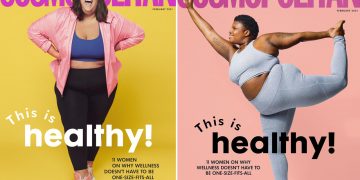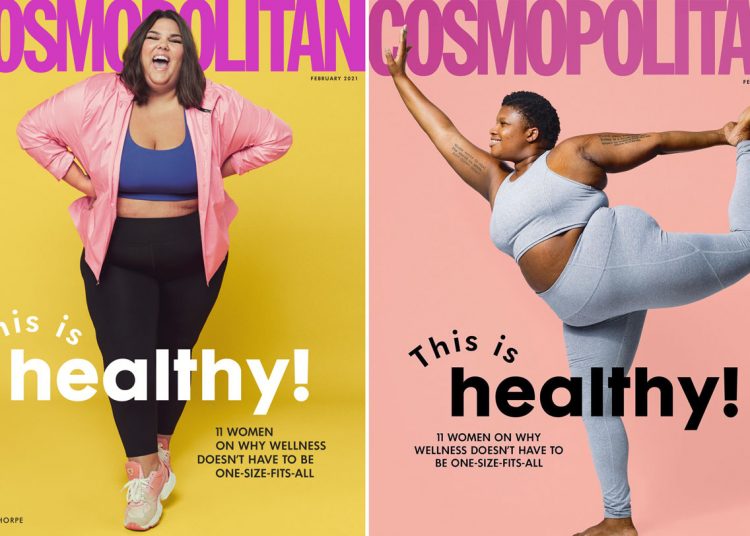Last updated on January 19th, 2021 at 10:19 am
The “fat versus fit” debate rages on, but Cosmopolitan isn’t wading into the discussion. They’re going full belly-flop into the controversial subject matter, much to the detriment of the family and young impressionable women.
The February edition of the women’s magazine will feature “plus-size” women with the subtext “This is healthy! 11 women on why wellness doesn’t have to be one-size-fits-all”. The women featured range from yoga instructors to one who was slated to represent Britain at the postponed Tokyo Olympic Games.
One of them is Callie Thorpe, a social media influencer and “plus size” blogger, who comments that people like her “are trolled for being fat.” She feels that by being welcomed into a community of other plus-size women, she now realizes “the importance of focusing on my mental health and addressing issues with my anxiety, and finding ways to take care of myself.”
Ms. Thorpe has 250,000 followers on her Instagram account titled “The Confidence Corner.” Moreover, she is called in some corners one of social media’s best-known advocates of “self-love”.
Not long ago, the term “self-love” was usually applied to one who displayed inflated love or pride in oneself. Today, in the world of social media, the phrase no longer intimates narcissism. And considering the facts surrounding health and wellness, one must wonder if this “self-love” being sold is actually self-destruction.
The culture has been familiarized with the term “body positivity,” which isn’t necessarily just about excess weight and being fine with it, but about celebrating bodies that don’t fit conventional size norms. Many “body positivity” advocates say they’ve had enough of people making assumptions based on appearance, gender, or any other superficial aspect. To that point, any person who wishes true charity for his or her neighbor would agree. But how is it charitable to ignore the plain fact that excess weight is detrimental for any human being? From the effects on muscles and joints, the condition and function of our internal organs, and even from the psychological standpoint, the science on obesity is clear.
And yet, many of these social media influencers have an army of followers and advocates. The hashtag #bodypositivity boasted some 3 million posts on Instagram in 2017. In just four years, it has ballooned to 14.8 million posts.
As Lauryn Overhultz, a columnist for The Daily Caller, put it: “Body positivity is the euphemism woke digital netizens have adopted in recent years in order to make obesity — the leading cause of death in America — seem less pernicious, indeed even a source of pride.”
“Body positivity” may be gaining ground, but there remain medical professionals who will not agree with everything it represents.
Health expert and NHS weight-loss consultant Dr. Sally Norton says she’s noticed a rise in “body positive” patients in recent years. “Don’t forget it is now ‘normal’ to be overweight or obese – well over 50% of the population are,” she says. “That means it is becoming more and more accepted and people are, quite rightly, fighting back against stigma or ‘body-shaming.’ I completely support this – but at the same time, we shouldn’t be accepting ‘fat’ as the new normal.”
But the fact remains, it is becoming the new normal. The movement is apparently so emboldened, it now shames any formerly overweight person who has shed pounds. And sadly, this shaming comes mostly from women, directed at other women.
We saw this last year when pop-singer Adele took to social media to show off her shocking weight loss. In response, some “body positivity” activists said that, “complimenting her smaller body is fat-phobic.”
Also last year, former “Biggest Loser” star Jillian Michaels injected the “fat versus fit” issue into a Buzzfeed digital broadcast. When asked by the host about Hollywood celebrating people with “different bodies” and how that pertained to an entertainer like rap-singer Lizzo, Michaels responded, “But, why are we celebrating her body? Why does it matter? That’s what I’m saying. Like, why aren’t we celebrating her music? ‘Cause, it isn’t going to be awesome if she gets diabetes. I’m just being honest. There’s never a moment where I’m like ‘I’m so glad she’s overweight!’”
Michael’s continued, almost as if to look straight into the eyes of young American women and mothers, and stated emphatically, “There’s nothing beautiful about clogged arteries. I’m not saying you are not a beautiful person, I’m not saying you’re not physically beautiful, but I’m saying being obese is not a beautiful thing. It’s actually a sad thing.”
Yet, almost a year to the date after that Michael’s interview, society does not seem to get it. And the forthcoming Cosmo edition is further proof that the war against women and families is another notch in a belt that is continuously being slackened.




















Discussion about this post